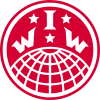
The Industrial Workers of the World (IWW), whose members are nicknamed "Wobblies", is an international labor union founded in Chicago in 1905. The nickname's origin is uncertain. Its ideology combines general unionism with industrial unionism, as it is a general union, subdivided between the various industries which employ its members. The philosophy and tactics of the IWW are described as "revolutionary industrial unionism", with ties to socialist, syndicalist, and anarchist labor movements.

William Dudley Haywood, nicknamed "Big Bill", was an American labor organizer and founding member and leader of the Industrial Workers of the World (IWW) and a member of the executive committee of the Socialist Party of America. During the first two decades of the 20th century, Haywood was involved in several important labor battles, including the Colorado Labor Wars, the Lawrence Textile Strike, and other textile strikes in Massachusetts and New Jersey.
The United States textile workers' strike of 1934, colloquially known later as The Uprising of '34 was the largest textile strike in the labor history of the United States, involving 400,000 textile workers from New England, the Mid-Atlantic states and the U.S. Southern states, lasting twenty-two days.
Craft unionism refers to a model of trade unionism in which workers are organised based on the particular craft or trade in which they work. It contrasts with industrial unionism, in which all workers in the same industry are organized into the same union, regardless of differences in skill.
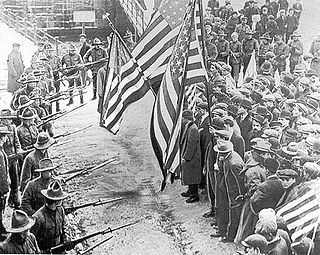
The Lawrence Textile Strike, also known as the Bread and Roses Strike, was a strike of immigrant workers in Lawrence, Massachusetts, in 1912 led by the Industrial Workers of the World (IWW). Prompted by a two-hour pay cut corresponding to a new law shortening the workweek for women, the strike spread rapidly through the town, growing to more than twenty thousand workers and involving nearly every mill in Lawrence. On January 1, 1912, the Massachusetts government enforced a law that cut mill workers' hours in a single work week from 56 hours, to 54 hours. Ten days later, they found out that pay had been reduced along with the cut in hours.

Joseph James "Smiling Joe" Ettor (1885–1948) was an Italian-American trade union organizer who, in the middle-1910s, was one of the leading public faces of the Industrial Workers of the World. Ettor is best remembered as a defendant in a controversial trial related to a killing in the seminal Lawrence Textile Strike of 1912, in which he was acquitted of charges of having been an accessory.

The 1913 Paterson silk strike was a work stoppage involving silk mill workers in Paterson, New Jersey. The strike involved demands for establishment of an eight-hour day and improved working conditions. The strike began in February 1913, and ended five months later, on July 28. During the course of the strike, approximately 1,850 strikers were arrested, including Industrial Workers of the World (IWW) leaders Bill Haywood and Elizabeth Gurley Flynn.

Anna LoPizzo was an Italian immigrant striker killed during the Lawrence Textile Strike, considered one of the most significant struggles in U.S. labor history.

Emil Rieve was an American labor leader. He was president of the Textile Workers Union of America (TWUA) from 1939 to 1956, a vice president of the Congress of Industrial Organizations (CIO) from 1939 to 1955, and a vice president of the AFL-CIO from 1955 to 1960.
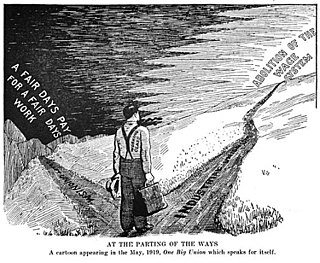
The Industrial Workers of the World (IWW) is a union of wage workers which was formed in Chicago in 1905 by militant unionists and their supporters due to anger over the conservatism, philosophy, and craft-based structure of the American Federation of Labor (AFL). Throughout the early part of the 20th century, the philosophy and tactics of the IWW were frequently in direct conflict with those of the AFL concerning the best ways to organize workers, and how to best improve the society in which they toiled. The AFL had one guiding principle—"pure and simple trade unionism", often summarized with the slogan "a fair day's pay for a fair day's work." The IWW embraced two guiding principles, fighting like the AFL for better wages, hours, and conditions, but also promoting an eventual, permanent solution to the problems of strikes, injunctions, bull pens, and union scabbing.

Mary Kenney O'Sullivan, was an organizer in the early U.S. labor movement. She learned early the importance of unions from poor treatment received at her first job in dressmaking. Making a career in bookbinding, she joined the Ladies Federal Local Union Number 2703 and organized her own group from within, Woman's Bookbinding Union Number 1.
The United Textile Workers of America (UTW) was a North American trade union established in 1901.

Skowhegan is the county seat of Somerset County, Maine, United States. As of the 2020 census, the town population was 8,620. Every August, Skowhegan hosts the annual Skowhegan State Fair, the oldest continuously held state fair in the United States. Skowhegan was originally inhabited by the indigenous Abenaki people who named the area Skowhegan, meaning "watching place [for fish]," and were mostly dispersed by the end of the 4th Anglo-Abenaki War.
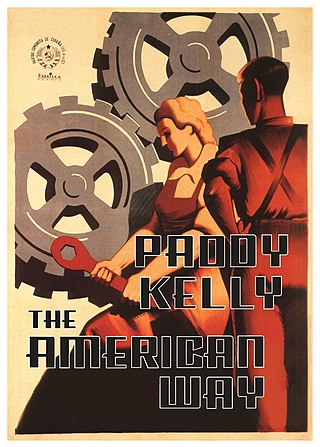
The American Way is the second in a four novel series entitled Building of Empire, Crime and Politics; the Cornerstone of America by author Paddy Kelly. The American Way relates the events leading up to and through the Great Woolen Strike of 1912 in Lawrence, Massachusetts when approximately 40,000 immigrants from nearly every country in Europe, sharing 30 religions and 127 ethnic back grounds organized a seven-week strike against the richest man in the world. This despite the fact that only ten percent of them spoke English. Released in 2011 the title of this historical fiction is originally taken from the opening lines of the 1950s Superman television program Adventures of Superman (1952–1958) ".. . truth, justice and the American way!" However the catch phrase is meant as an entendre in that the American Way, usually perceived as the right and good way, is also in reality a two edged sword of unprecedented levels of corruption found at all levels of industry and government at the time the story is set.
The Metal and Machinery Workers Industrial Union No. 440 (MMWIU) was a labor union in the United States which existed from 1907 to 1950. It organized workers in the manufacturing industry and was affiliated with the Industrial Workers of the World (IWW).
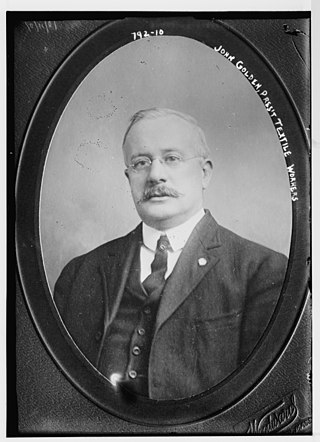
John Golden was an American textile worker and trade union leader. He was elected president of the United Textile Workers of America (UTW) each year from 1902 until shortly before his death in 1921. At the time of his death, he was declared as important to textile unionism as John Mitchell was to mining unionism.
The 1914–1915 Fulton Bag and Cotton Mills strike was a labor strike involving several hundred textile workers from the Fulton Bag and Cotton Mills in Atlanta, Georgia, United States. The strike, which involved about 500 millworkers, began on May 20, 1914, and ended almost a year later on May 15, 1915, in failure for the strikers.

The 1912–1913 Little Falls textile strike was a labor strike involving workers at two textile mills in Little Falls, New York, United States. The strike began on October 9, 1912, as a spontaneous walkout of primarily immigrant mill workers at the Phoenix Knitting Mill following a reduction in pay, followed the next week by workers at the Gilbert Knitting Mill for the same reason. The strike, which grew to several hundred participants under the leadership of the Industrial Workers of the World (IWW), lasted until January the following year, when the mills and the strikers came to an agreement that brought the workers back to the mills on January 6.

The New England Textile Strike was a strike led by members of the United Textile Workers of America (UTW) principally in the U.S. states of Massachusetts, New Hampshire, and Rhode Island. Throughout the duration of the strike, an estimated 68,000-85,000 workers refused to work. Alongside the UTW, the IWW and ATW played major organizing roles within it, with the strike lasting for around 200 days at most mills.
The Portland Longshoremans Benevolent Society was a trade union and benevolent society in Portland, Maine, United States. It existed as an independent organization from its founding in 1880 until it affiliated with the International Longshoremen's Association in 1914. Incorporated in 1880, it was composed of primarily Irish and Irish-American dockworkers who loaded and unloaded ships in the Portland waterfront. The early peak of PLSBS membership occurred in 1899 when the union had 868 members. By 1910, declines in the amount of Canadian grain exported through the port meant decreased membership, which hit 425. Having been defeated in two major strikes, the PLSBS affiliated with the International Longshoremen's Association in early 1914. Similar independent unions had recently joined the ILA in Boston and elsewhere.
















